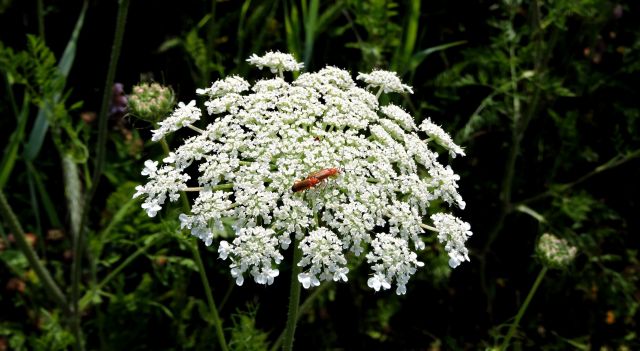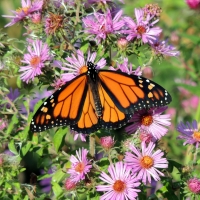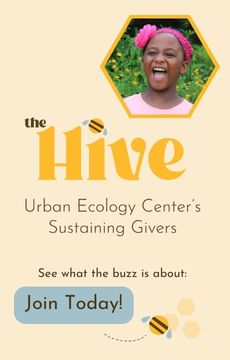The first chapter was a survey of naturalists who pioneered scientific work observing animal behavior. The sidebar had pictures and brief biographies. That’s where I first heard of Jean Henri Fabre, a French entomologist. Fabre lived a long life—1823 to 1915—and a humble one. He earned a living as a school teacher for most of his life, pursuing field studies of insects (and arachnids) in his spare time out of sheer love and fascination. When he was 55 he acquired a home in southern France and used his house and grounds as a laboratory and sanctuary for the rest of his life.
Fabre was just one of many researchers described in Animal Behavior. I went on to read the popular works of some of ethology’s other pioneers and popularizers: Konrad Lorenz, Karl Von Frisch and Sally Carrighar. But in all my library and bookstore browsing, I never ran across anything by Fabre until I was on my way to a work conference and had some free time at the airport.

Jean-Henri Fabre was best known for his findings in the field of entomology, the study of insects
Mitchell Field in Milwaukee is the only airport I’ve ever been through that has a huge used bookstore—Renaissance Books. As soon as I checked my bag, I went to browse in the Science and Nature sections. There it was— The Insect World of J. Henri Fabre, with Introduction and Interpretive Comments by Edwin Way Teale, a discard from the Wauwatosa Public Library. It had been borrowed four times, then discarded in 1982. Wauwatosa’s loss was my gain. I think that other than Grimm’s Fairy Tales, The Insect World is my favorite book of all time. The clarity, detail, and simplicity of the prose is unsurpassed.
This is as far as I usually get when I try to write about Fabre. Then I open his books, looking for a quote that’s a good example of his extraordinary patience and power of observation. A passage that shows his storytelling genius. Hours pass. I can’t decide which passage or paragraph to choose. Should I direct new readers to the chapter that describes a marathon eight-day observation of a marching file of caterpillars? Or quote his study of how the tiny spittlebug produces the foam it lays eggs in? The portrait of a dung beetle’s daily activities? This chapter includes a minute-by-minute account of observations meant to discover if one dung beetle goes to others to “get help” rolling a large ball, or if others just “help” in order to “steal”.

Red Soldier Beetle
It’s both meticulous and hilarious. The anthropomorphism (the use of human-like adjectives such as “proud” or verbs such as “steal”) in his prose animates and maintains interest in what could be an otherwise tedious account. It brings literary value and joy to works that have huge scientific value as well.
Join scarab beetles and Fabre at a heap of fresh cow dung: Who is this that comes trotting towards the heap, fearing lest he reach it too late? His long legs move with awkward jerks, as though driven by some mechanism within his belly; his little red antennae unfurl their fan, a sign of anxious greed. He is coming, he has come, not without sending a few banqueters sprawling.
Once you’ve read Fabre, you’re never alone. Outside, you notice the variety of tiny living things you share the world with. You take a moment here, a moment there to examine the tiny flying insects that land on your arm, the spider dropping from the porch light.
Fabre really loved insects, spiders, and other “lowly” creatures and it permeates his writing. But he was a naturalist, not a creator of fables or tales. He watched insects and spiders to determine what they do to survive, grow, and reproduce—not to perpetuate erroneous folk beliefs about their behavior. And he devised ingenious experiments.
His statement about the need to go beyond observation; about the need to experiment in order to test assumptions, or conclusions drawn after observing, seems relevant for all times and disciplines. Without experimentation he says, It is not the animal that we are now consulting upon the nature of its aptitudes, upon the primary motives of its activity, but our own opinions, which always yield a reply in favor of our cherished notions.
My Mediocre Powers by Sue Blaustein
What if I
was patient
every day?
Patient enough
to observe,
to observe things
long enough.
Long enough
to learn – to learn
directly.
I should be patient,
and learn directly
from what I see.
From observation
and patience,
not from reading.
----
Written by Urban Ecology Center community scientist Sue Blaustein who has contributed to numerous wildlife surveys, particularly those involving observations of the invertebrate world. Sue’s poem was a reflection after reading about Fabre.
Sue is featured in the invertebrate video where she describes how community scientists like her are following in Fabre’s footsteps by observing and researching the often overlooked invertebrates in our parks and greenspaces. Subscribe to The Urban Ecology Center’s Weekly R&R e-newletter to learn how you can get involved with our insect research and other community science and restoration opportunities.
Numerous biographies of Fabre are available at the Milwaukee County Library and his original writings are available on Amazon or local bookstores. You may even find a copy on a shelf of used books like Sue did.





